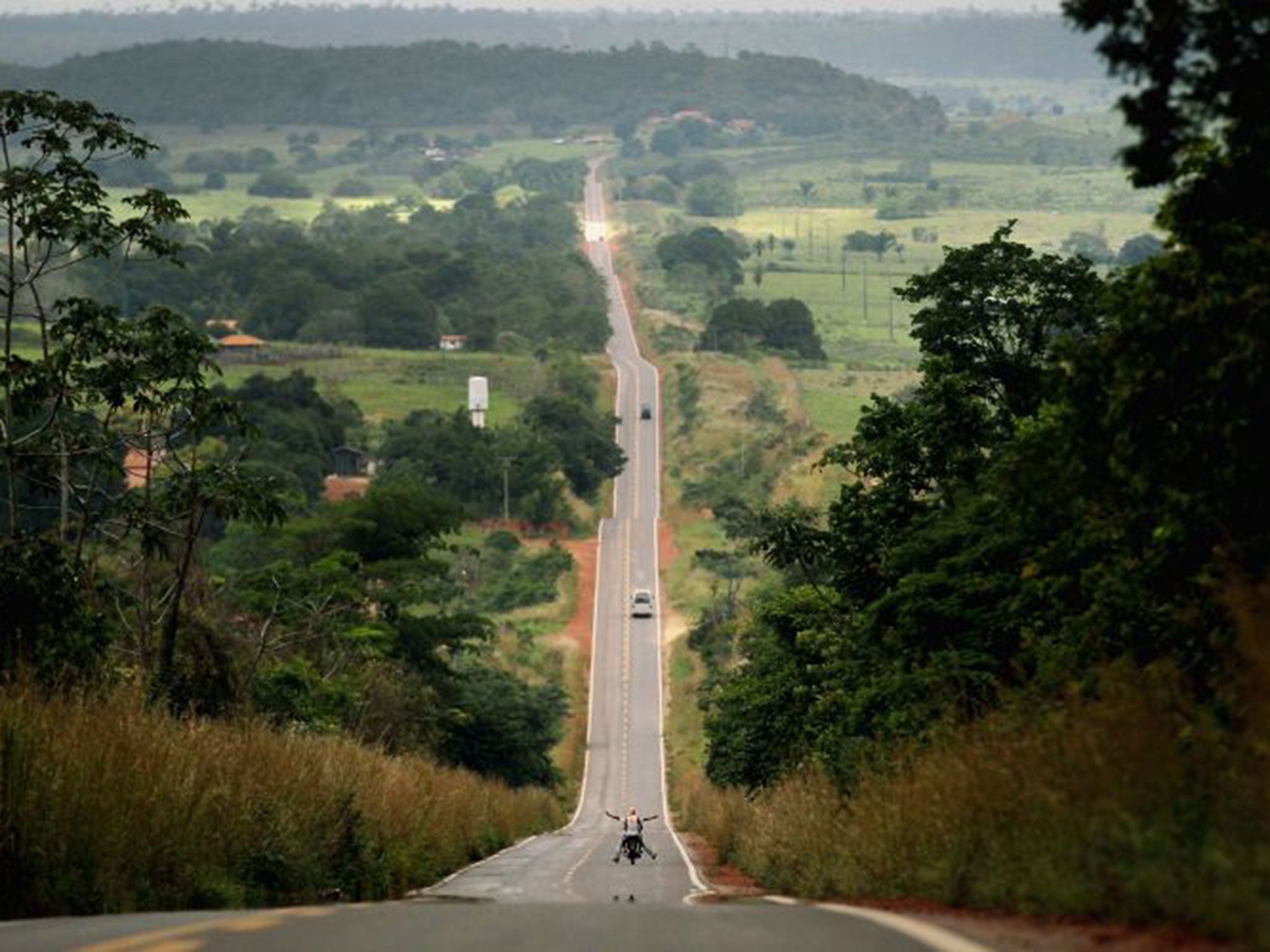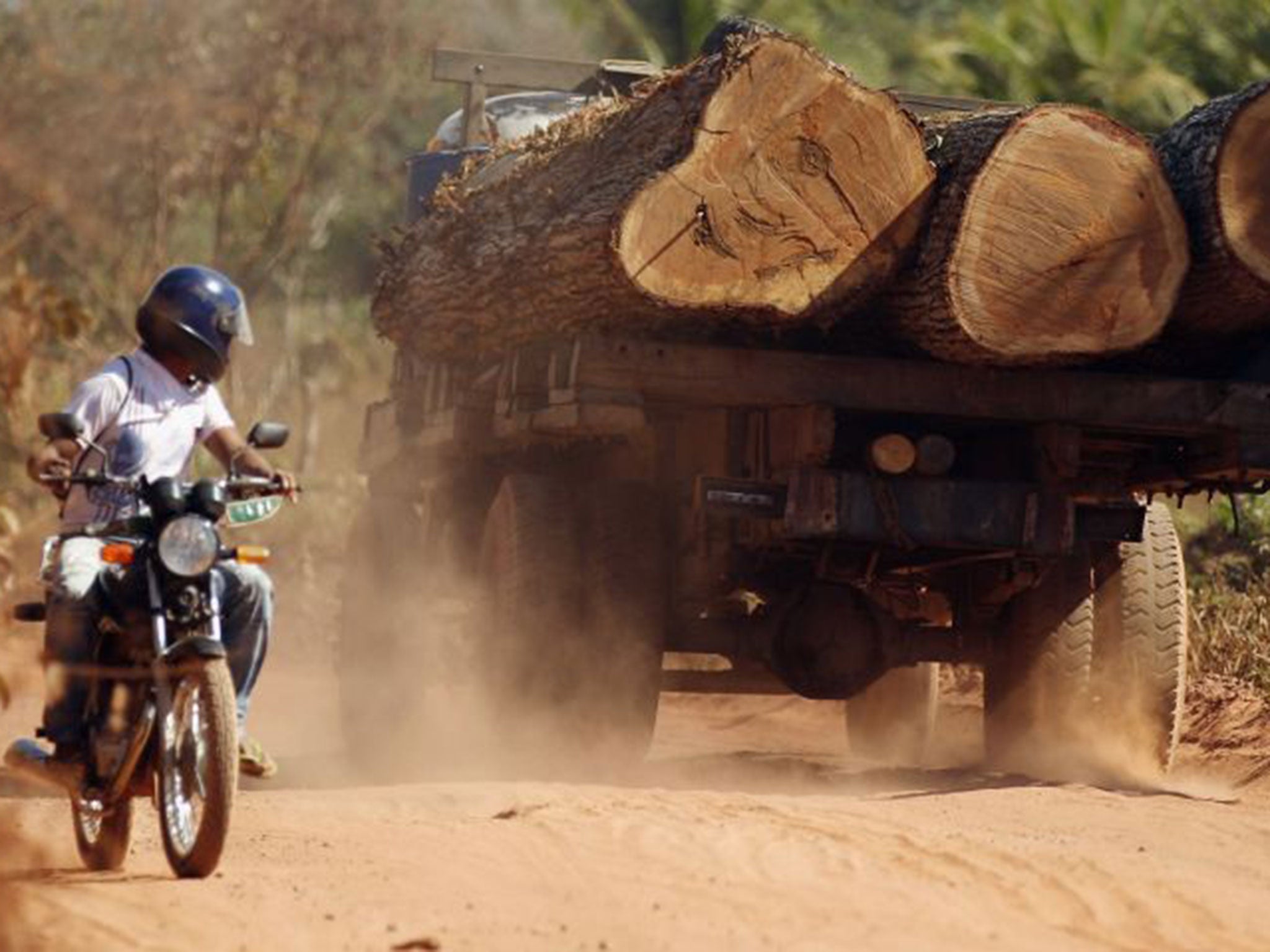Last great regions of pristine wilderness from Asia to Amazon under threat from massive road-building projects, scientist warns
International finance is behind massive plans to bulldoze pristine areas from Sumatra to the Serengeti

Your support helps us to tell the story
From reproductive rights to climate change to Big Tech, The Independent is on the ground when the story is developing. Whether it's investigating the financials of Elon Musk's pro-Trump PAC or producing our latest documentary, 'The A Word', which shines a light on the American women fighting for reproductive rights, we know how important it is to parse out the facts from the messaging.
At such a critical moment in US history, we need reporters on the ground. Your donation allows us to keep sending journalists to speak to both sides of the story.
The Independent is trusted by Americans across the entire political spectrum. And unlike many other quality news outlets, we choose not to lock Americans out of our reporting and analysis with paywalls. We believe quality journalism should be available to everyone, paid for by those who can afford it.
Your support makes all the difference.The last great regions of pristine wilderness – from Asia to the Amazon – are threatened by an unprecedented road-building programme financed by aggressive development banks with little interest in protecting the natural world, a leading environmental scientist has warned.
Massive infrastructure and road-building are at the heart of huge development projects around the world, justified as vital attempts at helping the poorest attain a higher standard of living.
Scientists claim that we are living in the most explosive era of road and infrastructure expansion in human history – from the plains of the Serengeti to the rainforests of Sumatra. By 2050, they estimate, there will be an additional 25 million kilometres (15.5 million miles) of new paved roads globally, enough to circle the Earth 600 times.
Approximately 90 per cent of these new roads will be built in the developing world, and many of these will result in the first deep cuts into areas of pristine tropical rainforests to service the building of new mines and hydroelectric dams in some of the remotest places on earth.

However, experience has shown that the first roads mark the beginning of the end for the natural habitats where they are built, according to William Laurance, a distinguished research professor in environmental sustainability at James Cook University in Cairns, Australia.
“The best analogy I can use is that deforestation acts like a cancer. When the first road is built into a forested or wilderness area, deforestation tends to spread contagiously along the road route,” Professor Laurance said.
“The example I often cite is the first road to be built in the Amazon, which originally linked the city of Belem with Brasilia , the national capital,” he said. “It began as a razor-thin cut through the forest, but today has grown into a 400km-wide slash of forest destruction across the eastern Amazon.
“Because of such realities, the only real solution for limiting road impacts is to ‘avoid the first cut’ – keep roads out of wilderness areas, protected areas, and the remnants of rare ecosystems,” he added.
During his time as a scientist working in the Amazon, Professor Laurance saw how road-building triggered much wider environmental destruction. In the Amazon, some 95 per cent of forest destruction has occurred within 5km of a road, and for every 1km of legal road, there were another 3km of illegal roads spreading off it, he said.
“We are living in the most dramatic era of road and infrastructure expansion in human history. The world’s last surviving wildernesses – the Amazon, Congo basin, Siberia, boreal areas of Canada – are being penetrated and cut asunder by roads now. We have already crossed the Rubicon in this sense,” he said.
“To give a non-tropical example, the forests of Alberta, Canada, now have 800,000km of roads, and the road network there is increasing by 25,000km per year,” he added.
The Congo rainforest is reeling from a road-building “spree” with more than 50,000km of roads bulldozed into the rainforest, bringing loggers and poachers in their wake, he said.
In the last decade alone, this has resulted in ivory poachers killing around two thirds of the forest elephants that have lived safely among the trees for millennia.

International banks are helping to finance some of the 29 “development corridors” that will criss-cross sub-Saharan Africa, opening up many wild and inaccessible places to human pressures such as ivory smuggling, logging and the bushmeat trade.
“Yet many economists would look at these trends and applaud them,” said Professor Laurance.
“They say the developing world is simply developing and we should support this.” He cited the $60-$70 trillion to be spent on new infrastructure by the G20 nations over the next 15 years.
“This staggering sum will come from a variety of sources, such as public-private partnerships, pension funds, bilateral aid and the major development banks.
“This will be the single biggest financial transaction in human history and the environmental impacts will be Earth-shaking,” Professor Laurance said.
There are ways of minimising the impact of infrastructure development by, for instance, using existing waterways for transport rather than building the first roads, or by concentrating on road improvements in areas already settled. But he believes environmental concerns are being brushed aside in the drive to exploit natural resources.
He is particularly worried about two development banks, the new China-dominated Asian Infrastructure Investment Bank (AIIB) based in Beijing, and the Brazilian Development Bank (BNDES). Both banks allegedly operate to different environmental standards than the more traditional development banks, he claimed.
“My main concern is that the AIIB and BNDES will force the traditional lenders to loosen their environmental and social concerns in order to remain competitive,” he said.
“The BNDES has funded a range of highly damaging infrastructure projects, notably including some massive Amazonian dams that have flooded vast areas of forest and promoted a spate of associated road and power line building and deforestation,” he explained.
“Regarding the AIIB, it hasn’t actually begun functioning yet but two things are clear. First, it is hugely capitalised, especially by China – already having at least half of the capitalisation of the World Bank and IMF,” he said.
“China has been notorious for placing a low priority on environmental and social concerns in its many dealings internationally.
“In such senses it tends to be agnostic –leaving these concerns to the local governments to deal with. All it cares about is getting the natural resources it desires, in whatever way is necessary.”
This year, France and Germany decided to follow the UK’s lead in becoming members of the Chinese-led bank, the AIIB, which has shocked other countries, including the United States which sees the bank as a rival to the western-dominated World Bank.
A spokesman for the BNDES said it has a “series of mechanisms” designed to evaluate projects, ranging from “meticulous analysis of any social and environmental impacts in any project receiving financial support, to financing for investments that generate direct benefits to boost environmental quality and to reduce social and regional inequalities in the country”. The AIIB did not respond to a request for comment.
Critics argue that the new European members will give the AIIB credibility that it doesn’t deserve. However, others have suggested that Britain and the other western nations could work on the inside trying to tighten up the bank’s environmental standards – although the sheer size of the bank’s development fund will undoubtedly mean more road-building in areas of pristine wilderness.
“The only way I would see a real change of tack is if nations such as the UK, Germany, France, Australia and New Zealand have the courage and influence to take a strong stand and demand social and environmental safeguards,” Professor Laurance said. “But will they? And if they did, would China respond? I have my doubts.”
Join our commenting forum
Join thought-provoking conversations, follow other Independent readers and see their replies
Comments